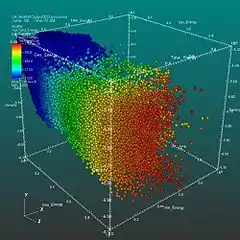Glyph (data visualization)
In the context of data visualization, a glyph is any marker, such as an arrow or similar marking, used to specify part of a visualization. This is a representation to visualize data where the data set is presented as a collection of visual objects. These visual objects are collectively called a Glyph.
In the context of data visualization, a glyph is the visual representation of a piece of data where the attributes of a graphical entity are dictated by one or more attributes of a data record.
— Matthew O. Ward, Multivariate data glyphs: Principles and practice, In: Handbook of data visualization (2008), p.180.

Information Visualization (InfoVis)
Constructing Glyphs
Glyph construction can be a complex process when there are many dimensions to be represented in the visualization. Maguire et al proposed a taxonomy based approach to glyph-design that uses a tree to guide the visual encodings used to representation various data items.[1]
Complex Glyphs
Duffy et al created perhaps one of the most complex glyph representations with their representation of sperm movement.
Scientific Visualization (SciVis)
Key Advantages
It helps visualizing data relation in Data Analysis, Statistics, etc. by using any custom notation.
References
- Maguire, E.; Rocca-Serra, P.; Sansone, S. A.; Davies, J.; Chen, M. (2012-12-01). "Taxonomy-Based Glyph Design #8212;with a Case Study on Visualizing Workflows of Biological Experiments". IEEE Transactions on Visualization and Computer Graphics. 18 (12): 2603–2612. doi:10.1109/TVCG.2012.271. ISSN 1077-2626. PMID 26357169.
- Chen, Chun-houh; Härdle, Wolfgang; Unwin, Antony, eds. (2008). Handbook of data visualization. Springer Handbooks of Computational Statistics. Springer. ISBN 978-3-540-33036-3.
